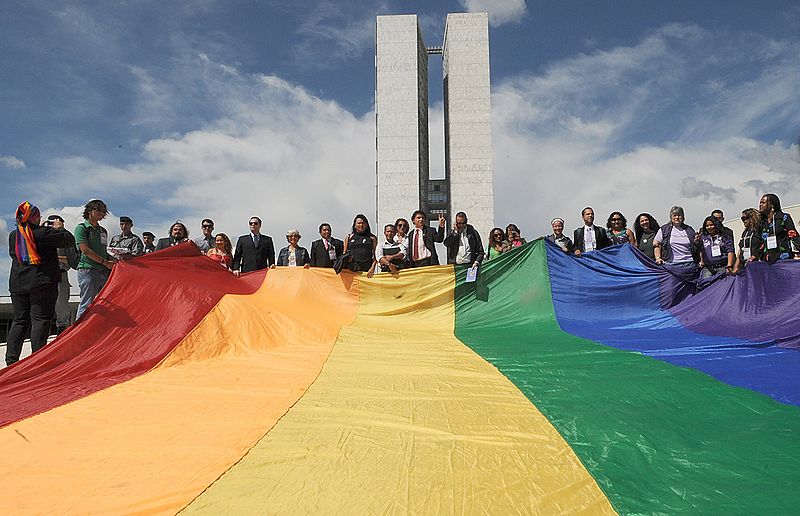
The Internet and the consolidation of new voices in politics
One of the most important uses of technology in electoral periods has been the articulation between individuals, candidates or not, to get information about the possibilities of voting beyond the usual suspects. In the 2014 municipal elections, we already had important lists of candidacies appearing, like VOTE LGBT, which had the goal of increasing the representation of lesbians, gays, bisexuals, transvestites, and transsexuals in the Brazilian National Congress, and VOTETRANS, created by the Nation Association of Transvestites and Transexuals (ANTRA). It was also the case of the list of indigenous candidacies published by Yandê Radio, a vehicle specialized in the topic, in 2016 (we wrote about this here).
This year, the data indicates a 400% increase of LGBTI candidacies and 59% of indigenous ones when compared to 2014 — the latter even created a Parliamentary Front. The National LGBTI+ Platform was also created, which gathers candidates of the community and allies and supporters of the manifest “LGBTI+ 2018 Elections” and other candidates compromised with the defense of LGBTI rights in their mandates.

Over this last electoral period, the active engagement of women in the process was very explicit — as the page Women Against Bolsonaro (Mulheres Unidas Contra Bolsonaro) on Facebook indicates, and was the object of important disputes and attacks, as we have reported. There was also the effort to make feminine and feminist candidacies more visible through initiatives like VoteNelas, Meu Voto Será Feminista, Campanha de Mulher, Encontre sua Candidata and the Campaign “Política Feminista para transformar o Poder”.
Focusing specifically on black women, the Campaign “Mulheres Negras Decidem”, which mainly used Instagram, aimed to produce data during the whole year on their political participation and encourage candidates of this segment.
Initiatives from organizations and individually by activists also joined black candidacies, as it was the case with the list made by the Coordenação Nacional de Articulação das Comunidades Negras Rurais Quilombolas (CONAQ), of the list of quilombola candidacies made by the Vote em Preto portal, which gathers information about black candidates in six Brazilian states, and of the Facebook group 1 milhão de brancos votando em candidatos pretos, that promoted men and women candidates, calling white people to publicly compromise to vote on them.
Beyond the lists, in 2018 we again had initiatives to connect voters to candidates that took into account an agenda related to identities and also Human Rights. The most relevant one is #MeRepresenta, a project which stems from VOTE LGBT and that today is also constituted by the Feminist Network of Jurists and by Blogueiras Negras. In 2016, the project encouraged candidates running for the Town Halls and City Councils to answer a questionnaire identifying their opinions on fourteen agendas related to Human Rights. By answering the same questions on a platform, voters were presented lists of candidates with similar positionings. In 2018, the portal structured itself around nine main topics, defined after a consultation with organizations from the civil society: (1) gender, (2) race, (3) LGBT, (4) traditional peoples and environment, (5) health, education, and work, (6) security and Human Rights, (7) Corruption, (8) Drugs, (9) Migrants.
The “matching” model implemented by #MeRepresenta has been used by at least another ten websites or apps that do not have the specific focus on the rights of minorities, like Tem Meu Voto, Sintonia Eleitoral, Jogo Eleitoral, Match Eleitoral da Folha, Calculadora de Afinidade Eleitoral, Partidômetro das Eleições para Deputado, Bússola Eleitoral, Appoie and Voz Ativa.
Even though similar projects or even the same ones were already available in 2016, there has been a clear growth and strengthening of them on the 2018 electoral process. This may have a relation to a moment in which the so-called “identity agendas” were at the core of the process, whether in a propositive character or as a way to disqualify candidates (accusations of misogyny, racism, homo/lesbo/trans/biphobia), or the disqualification of the agenda and growing violence connected to it (which we attempted to follow and will write about). Its effects over the next processes should be measured by the light of several factors, including changes in the electoral legislation (proportional access to resources by women from 2018, for instance, in addition to the already existing 2009 law of minimum share).
It is never simple to assert motives but it is quite clear how the composition of the Chamber of Deputies has been expressively altered in terms of gender: we had 50% more women elected in comparison to the 2014 elections, even if women still represent only 15% of the Chamber (according to data from Gênero e Número). We also elected the first indigenous woman as Federal Deputy, Joênia Wapichama (Rede), for the state of Roraima. Collective mandates — a growing phenomenon in these elections — guaranteed the entrance of two transgender women in Legislative Councils: Robeyoncé Lima (JUNTAS/PSOL) in Pernambuco and Erika Hilton (Bancada Ativista/PSOL) in São Paulo, a state that also elected Erica Malunguinho (PSOL). It was the first time in history that transgender women were elected for these positions.
Team responsible for the content: Natália Neris and Mariana Valente
Translation: Ana Luiza Araujo